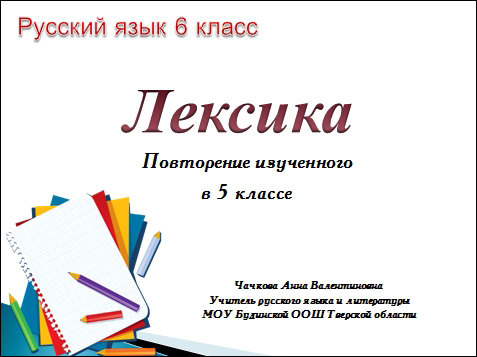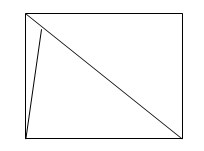teacher of Russian language and literature
MOU Budinska OOSH
Tver region
This summary of the lesson of the Russian language in the 6th grade is intended for the textbook Baranov M.T. etc. This is the first lesson in the study of the topic: “Lexics”. It will help to recall the theoretical information about vocabulary received by students in the 5th grade and prepare for further study of this topic in the 6th grade.
Objective of lesson: (slide 2)
- to consolidate the concepts of lexicology as a science of language;
- fix the concept of “lexical” and “grammatical” meaning of words;
- fix the concepts of unambiguous and multi-valued words, figurative meaning of the word; synonyms, antonyms.
Class progress
1. Org. lesson start.
2. Dictionary and spelling work. (slide 3)
Sev..te poem, s..to put at a talking stream, to s..dil.to give the situation, s.dil.carrots, dorm.t reeds (?), hot key (?), good comrade (?), bright.m color, flat weather, verna.go friend.
- Test yourself (slide 4)
— (slide 5-6)Find words that you need to know their lexical meaning.(Dedicate, sit, discharge, thin).
- Choose synonyms for adjectives (Hot - hot, burning; good - excellent excellent, excellent; bright - juicy, saturated; bad - bad, bad, unimportant; faithful - reliable).
- Write down antonyms by wordhot, flashy.
- Write down the words used in a figurative sense. Make a list of words in which they would have a direct meaning (talking, discharge, sleep).
Write a word whose meaning can only be defined in context (word or sentence). What are these words called?homonymous)
- Using the explanatory dictionary of the textbook, determine whether a single or multi-valued wordhot, colour.
3. Working with texts.
- Write down the lyrics.(Slide 7)
1. The aspen chills,
Trembles in the wind,
Chilling in the sun,
It freezes in the heat.
2. If you gave a birch a comb,
Changed the birch hairstyle:
In the river as in a mirror, looking,
I would have combed the curly strands,
And she'd make a habit of it.
In the morning, braid a pigtail.
And. Tokmakova.
— (Slide 8)What's a metaphor? ?figurative meaning of a word based on the similarity of objects or phenomena)
- What metaphors does the poet use to present the picture more vividly?
- Write from the first passage synonyms to the wordfreeze. What is their role in the text? ?Chill, shake, chill. Thanks to them, a special expressiveness of the text is achieved.)
- Write in the second passage the verbs that are used in a figurative sense. Graphically explain in them the spelling of the vowel in the horse words.
- Select and write down synonyms for the wordlook. ?Look, look, look, look, keep your eyes open, keep your eyes open.)
- Is a synonymous replacement always possible? For example,watch?
4. Lexical Dictation (Slide 9)
- Determine the lexical meaning of the word and write it down.
- All words of language (vocabulary).
- vocabulary of one person (lexicon)
- Linguistics section studying vocabulary (lexicology)
- Words with one lexical meaning (unambiguous)
- Words with multiple lexical meanings (multi-valued)
- Words of one part of speech, the same in sound and writing, but different in meaning (homonim)
- words of the same part of speech, meaning the same, but with different shades of meaning. (synonyms)
(Slide 10) - Test yourself
5. Homework.
- Know the rule on the page. 51 p.20.

{module Google_kvadrat}
The presentation contains 10 slides, with a volume of 1.1 MB, you can download for free.


